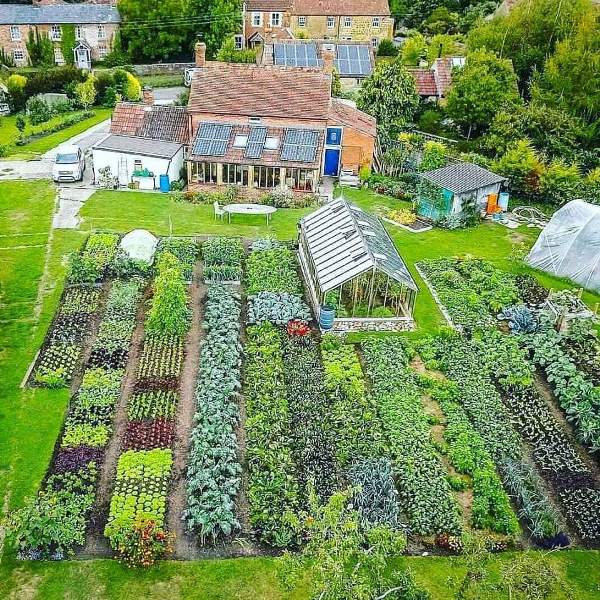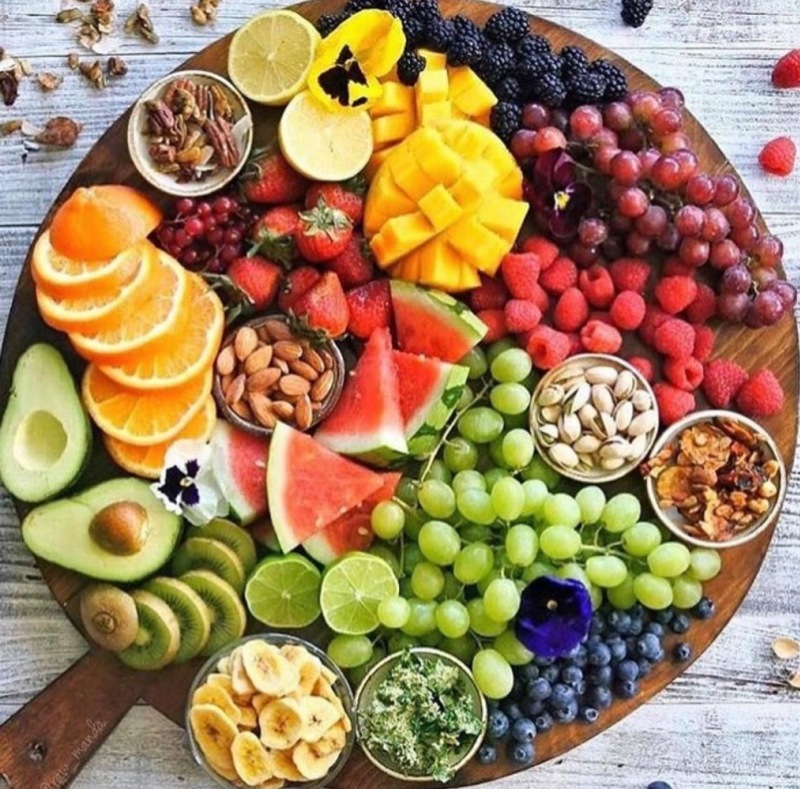Market Gardening: Difference between revisions
Siterunner (talk | contribs) No edit summary |
Siterunner (talk | contribs) No edit summary |
||
| Line 1: | Line 1: | ||
[[File: | [[File:Backyard Gardening - 2019.jpg]] | ||
| Line 8: | Line 8: | ||
''Farmers’ market food tastes better, simple as that. But that’s not the only reason you should start hitting up your weekly market as much as you can. Whether you care about your health or the health of the planet, there are dozens of reasons to support local farmers, including buying vegetables that have higher antioxidant levels and haven’t been fumigated with toxic chemicals. When you buy organic fruits and vegetables, you’re supporting less-toxic food production and could even save a farm or two, all while getting the best-tasting food you can find.'' -- http://www.rodalesorganiclife.com/ | ''Farmers’ market food tastes better, simple as that. But that’s not the only reason you should start hitting up your weekly market as much as you can. Whether you care about your health or the health of the planet, there are dozens of reasons to support local farmers, including buying vegetables that have higher antioxidant levels and haven’t been fumigated with toxic chemicals. When you buy organic fruits and vegetables, you’re supporting less-toxic food production and could even save a farm or two, all while getting the best-tasting food you can find.'' -- http://www.rodalesorganiclife.com/ | ||
Market Gardening; Farmers Markets; Gardens-to-Table; Peak-of-the-Season; Green Best Practices; Soil Regeneration; Advancing Horticulture; Organic Growing; 'No Dig' Agriculture; Composting, Propagating, Germinating; Planting and Growing Seedlings | |||
+ + + + + + + + + + | |||
'''Visit a Market Gardener in the Field''' | |||
<big>'''No-dig Gardening by Charles Dowding'''</big> | |||
https://www.facebook.com/charles.dowding -- https://www.youtube.com/channel/UCB1J6siDdmhwah7q0O2WJBg/videos -- https://www.wfga.org.uk/product/somerset-no-dig-workshop -- https://www.youtube.com/watch?v=Kf6CGj7xpFE -- https://www.youtube.com/watch?v=OXR92xHfgic | |||
+ + + + + + + + + + | |||
| Line 21: | Line 37: | ||
+ + + + + + + + + + | |||
| Line 59: | Line 75: | ||
+ + + + + + + + + + | + + + + + + + + + + | ||
<big>'''Healthy Diet, Healthy Lifestyle, Healthy Living'''</big> | |||
[[File:Via Dr Stacey Robinson.JPG]] | |||
| Line 69: | Line 91: | ||
[[Category:Food]] | [[Category:Food]] | ||
[[Category:Food-Related Policies]] | [[Category:Food-Related Policies]] | ||
[[Category:Green Best Practices]] | |||
[[Category:Health]] | [[Category:Health]] | ||
[[Category:Land Ethic]] | [[Category:Land Ethic]] | ||
Revision as of 18:12, 17 March 2019
Market Gardens/Farmers Markets/Alternative Agriculture
Local, better tasting, fresher, healthier -- market garden varieties/farmers market food/fresh-to-restaurant and -kitchen and your table
Farmers’ market food tastes better, simple as that. But that’s not the only reason you should start hitting up your weekly market as much as you can. Whether you care about your health or the health of the planet, there are dozens of reasons to support local farmers, including buying vegetables that have higher antioxidant levels and haven’t been fumigated with toxic chemicals. When you buy organic fruits and vegetables, you’re supporting less-toxic food production and could even save a farm or two, all while getting the best-tasting food you can find. -- http://www.rodalesorganiclife.com/
Market Gardening; Farmers Markets; Gardens-to-Table; Peak-of-the-Season; Green Best Practices; Soil Regeneration; Advancing Horticulture; Organic Growing; 'No Dig' Agriculture; Composting, Propagating, Germinating; Planting and Growing Seedlings
+ + + + + + + + + +
Visit a Market Gardener in the Field
No-dig Gardening by Charles Dowding
https://www.facebook.com/charles.dowding -- https://www.youtube.com/channel/UCB1J6siDdmhwah7q0O2WJBg/videos -- https://www.wfga.org.uk/product/somerset-no-dig-workshop -- https://www.youtube.com/watch?v=Kf6CGj7xpFE -- https://www.youtube.com/watch?v=OXR92xHfgic
+ + + + + + + + + +
Market Gardening
http://en.wikipedia.org/wiki/Market_garden
http://www.growingformarket.com/
http://www.themarketgardener.com/2014/12/10-reasons-market-gardening-fing-awesome/
http://www.amazon.com/The-New-Organic-Grower-Techniques/dp/093003175X
+ + + + + + + + + +
Tomatoes
Surprised? Probably not. A bland, mealy grocery-store tomato will never rival a fresh-from-the-farm-market tomato. And there are more benefits to local tomatoes than just taste. In Florida, where a third of the country’s fresh tomatoes are grown, slavery of illegal immigrants on tomato farms is a persistent problem. And farmers in that state apply five times as much fungicide and six times as much pesticide as farmers in California, which supplies another third of the country’s fresh tomatoes.
Carrots
You’ll never find anything but standard orange carrots at a supermarket, but you’ll find them in every hue, from purple to white, at local farm stands. Those colorful varieties, particularly purple carrots, have higher antioxidant values than commercially grown orange carrots, according to a study in the Journal of Agriculture and Food Chemistry. They’re also better for the planet. The energy required to store carrots when they’re out of season or being shipped long distances accounts for 60 percent of the greenhouse-gas emissions associated with carrot production.
Berries
Grab a pint of local strawberries, blueberries, or raspberries, and you’re doing the planet a favor. Because they perish quickly and have relatively short shelf lives, berries are often shipped from farm to distribution center via air freight, the most fossil-fuel-guzzling form of food shipment, from South America, Mexico, Canada, and even as far off as Poland. You’re also doing domestic growers a favor: According to Food & Water Watch, the United States imports $220 million worth of strawberries, while selling just $1.5 million worth of domestically grown berries.
Onions
Oddly enough, buying local onions could help save a farm. A few years ago, the U.S. government loosened trade restrictions with Peru, and the result has been a glut of imported onions that has dropped the price local farmers can get for their crops by half. As a result, domestic onion growers have slowly been cutting back on the number of onions they grow. All of Peru’s onion exports aren’t doing farmers there any good, either. The primary pesticide used on Peru’s onion crops, methamidophos, has been linked to sperm damage in farmers.
Asparagus
Sales of this crop have also benefited from our neighbors to the south. Asparagus imports from Peru have grown steadily over the past decade and now account for 51 percent of the asparagus we consume. The vegetable is now Peru’s largest agricultural export. The USDA requires all shipments of fresh asparagus from Peru to be fumigated with the dangerous pesticide methyl bromide, a neurotoxic chemical suspected of causing cancer. If that’s not bad enough, the chemical shortens asparagus’s shelf life, so it doesn’t even taste good by the time it arrives at the store! The best-tasting stalks are at the farmers’ market, even if the asparagus season is fleeting.
Peaches
Domestic, imported. Organic, nonorganic. Peaches just don’t taste good any other time of year than in midsummer, the height of their season, because they don’t hold up well during transport. Another benefit to buying local? Pesticides. According to the Environmental Working Group’s Shoppers Guide to Produce, peaches are treated with more pesticides than any other fruit. Buying local means you can grill the farmer to see which chemicals, if any, he or she uses.
Anything Organic
Despite the feel-good factor of supporting local farms, where your food is grown accounts for just a fraction of its environmental impact. It’s how your food is grown that matters most. According to a pair of Cornell agricultural researchers, 11 percent of your food’s environmental impact comes from food miles, whereas 83 percent comes from how it was grown, particularly when it’s grown with the greenhouse-gas-intensive fertilizers and pesticides used on chemical farms.
Grass-fed beef and dairy
Like organic food, the environmental impact of animal products has more to do with how they were raised than how far they traveled — which is why buying local beef and dairy is important. Animals raised entirely on grass produce 8 percent fewer greenhouse gas emissions and 30 percent lower ammonia levels than corn-fed animals raised in confinement. Since the term grass-fed isn’t always reliable (it’s not well regulated), local venues allow you to ask farmers direct questions about how their animals were raised.
+ + + + + + + + + +
Healthy Diet, Healthy Lifestyle, Healthy Living

